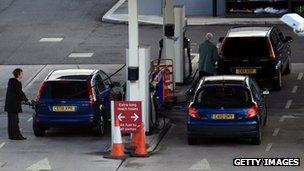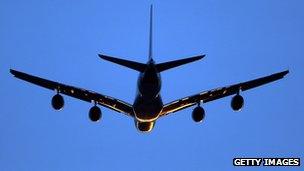Budget 2012: Fuel duty increase gets go-ahead
- Published
Chancellor George Osborne has said a 3.02 pence per litre fuel duty increase will take effect on 1 August as planned.
Motor industry officials were dismayed.
It is a "Budget blow-out which will force drivers off the road," said AA president Edmund King.
The chancellor said fuel duty would not rise faster than inflation, unless oil prices were to fall below £45 a barrel, well below Crude oil's current market price of about $125 (£79) a barrel.
'Ease the burden'
Mr Osborne also said he would welcome "private investment in the road industry", a move that could eventually result in better roads, but also in additional road charging.
Mr Osborne vowed to limit increases in vehicle excise duty, known as road tax, in line with inflation.
But his insistence that the Budget was part of efforts to "ease the burden on motorists" was not universally accepted within the industry.
"The increase in fuel duty makes no allowance for car-dependent, rural and disabled drivers," said Mr King.
'Green the business fleet'
Other measured announced by the chancellor were welcomed, however.
Industry body SMMT said Mr Osborne's tax and incentive programmes would encourage international investment in manufacturing and in research and development in the UK.

Fuel duty will rise in August, as planned
In particular, "a review by Lord Heseltine into the role of government in delivering pro-growth policies" and "continued support for low and ultra-low carbon vehicles" were deemed helpful by SMMT chief executive Paul Everitt.
Separately, changes to capital allowance and tax relief rules, as well as the car fuel benefit charge, should help "green the UK's business fleet", according to Mike Moore, automotive analyst with Deloitte, a consultancy.
"This means that businesses should seriously consider the carbon foot print of their fleet in order to control costs," he said.
John Lewis, chief executive of BVRLA, which represents fleet customers, said it was "no surprise that the Chancellor is continuing to incentivise further cuts in emissions by lowering the tax thresholds", but insisted his "efforts to drive down emissions-based capital allowances for company cars could be a step too far, too soon".
Air passenger duty
Mr Osborne also defied aviation industry lobbyists, announcing that an 8% rise in air passenger duty will go ahead on 1 April, as planned.

Aviation industry officials say raising duties could hurt the economy
Chief executives Carolyn McCall of Easyjet, Willie Walsh of International Airlines Group, Michael O'Leary of Ryanair and Steve Ridgway of Virgin Atlantic responded jointly in a statement.
"At a time when the government talks about creating jobs and growth, its blinkered insistence on further increases in air passenger duty achieves precisely the opposite," they said.
The Airport Operators Association's chief executive Darren Caplan agreed.
"We already have the highest aviation taxes in Europe, and this new increase will hit the tourism industry and needlessly jeopardise the recovery of the economy as a whole," he said.